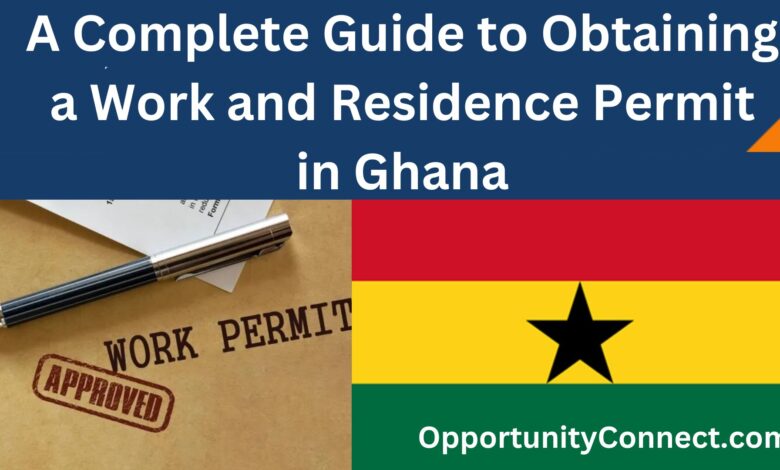A Complete Guide to Obtaining a Work and Residence Permit in Ghana

Introduction: Navigating the Path to a Work and Residence Permit in Ghana
Ghana, renowned for its vibrant culture, stable political environment, and expanding economy, is becoming an increasingly attractive destination for expatriates seeking work opportunities. Its diverse industries, ranging from agriculture to technology, coupled with a welcoming community, offer a promising landscape for professionals and entrepreneurs worldwide. However, for those ready to start their professional journey in Ghana, it’s crucial to understand the legalities and procedures for obtaining a work and residence permit.
Securing a work and residence permit in Ghana is of paramount importance. These permits not only comply with Ghanaian immigration laws but also authorize expatriates to work and live in the country legally. For expatriates, the first step towards a successful and lawful employment experience in Ghana involves navigating the process of obtaining these permits. As this guide delves deeper, we aim to provide a comprehensive understanding of the process for obtaining a work and residence permit in Ghana in 2024. Our goal is to ensure your transition to working and living in Ghana is as smooth and well-informed as possible.
Understanding Ghana’s Work and Residence Permit System
In Ghana, the work and residence permit system serves as a crucial framework for foreign nationals seeking employment. Consequently, these permits are more than mere formalities; they are indispensable legal documents that authorize non-Ghanaians to live and work in the country.
Work Permit in Ghana:
A work permit is essential for any foreign national who plans to be employed in Ghana. Initially, it is issued by the Ghana Immigration Service and is generally employer-specific, indicating that it is valid for work with a specific employer who sponsors the application. Consequently, the work permit confirms that the holder is legally employed in Ghana and serves as a necessary condition for acquiring a residence permit.
Residence Permit in Ghana:
- After obtaining a work permit, expatriates must apply for a residence permit.
- The residence permit allows foreign workers to legally reside in Ghana for the duration of their employment.
- It is also issued by the Ghana Immigration Service and is usually valid for one to four years, renewable as long as the individual remains employed in Ghana.
Legal Necessity for Foreign Workers:
- These permits are legally required for all non-Ghanaians who wish to work in Ghana.
- Working without a valid work and residence permit can lead to legal penalties, including fines and deportation.
Eligibility Criteria for Work and Residence Permits
The Ghanaian government has set specific criteria to regulate the influx of foreign workers and ensure they possess the necessary skills and qualifications needed in the Ghanaian job market.
Who Can Apply:
- Foreign nationals who have secured employment in Ghana are eligible to apply for a work permit.
- Typically, the employer in Ghana initiates the work permit application process on behalf of the employee.
Qualifications and Conditions for Eligibility:
- Applicants must have a confirmed job offer from a registered company in Ghana.
- Relevant qualifications and experience in the job role are necessary.
- Employers must justify the need for a foreign worker over a local candidate, often requiring proof that the skills needed are not readily available in the Ghanaian labour market.
- A clean criminal record and good health status are usually required, sometimes necessitating a medical examination and a police clearance certificate from the applicant’s home country.
Understanding these aspects of the work and residence permit system in Ghana is essential for foreign nationals planning to work there. Compliance with these regulations not only facilitates a smooth transition into the Ghanaian workforce but also ensures legal and professional security during their stay in the country.
The Application Process for a Work Permit in Ghana 2024
Securing a work permit in Ghana is a crucial step for foreign nationals who aspire to work in the country. Firstly, the process involves several stages, each demanding careful attention to detail. Consequently, this step-by-step guide will assist in navigating the application process for a Work and Residence Permit in Ghana in 2024.
A: Secure a Job Offer
- The first step is obtaining a formal job offer from a registered company in Ghana. This company will typically sponsor the work permit application.
B: Gather Required Documentation
- Key documents include a completed application form, the job offer letter, the applicant’s CV, educational and professional certificates, and a passport-size photograph.
- Additional documents may include a police clearance certificate and a medical report.
C: The employer initiates the Application
- The employer in Ghana usually starts the application process by submitting the necessary documentation to the Ghana Immigration Service (GIS).
- The application must include a justification for hiring a foreign national over a local candidate.
D: Payment of Fees
- Upon submission, the application is accompanied by a processing fee. The exact fee amount should be verified, as it can change annually.
E: Application Review by GIS
- The GIS reviews the application to ensure compliance with Ghana’s employment and immigration regulations.
- During this stage, additional information or documentation may be requested.
F: Issuance of the Work Permit
- Once approved, the GIS issues the work permit.
- The processing time can vary, but typically takes several weeks to a few months.
G: Applying for a Residence Permit
- Upon receiving the work permit, individuals should actively proceed to apply for a residence permit, enabling legal residency in Ghana.
- Both applicants and their employers must remain vigilant regarding updates in the application procedures and requirements for the Work and Residence Permit in Ghana in 2024.
Diligently ensuring the accuracy and prompt submission of all required documentation will significantly streamline the application process.
Applying for a Residence Permit in Ghana After Securing a Work Permit
After successfully obtaining a work permit in Ghana, your next essential step is to apply for a residence permit. This permit is necessary for legal residence in the country during your employment. Below is a detailed guide on the procedure, required documentation, costs, and processing time for obtaining a residence permit in Ghana in 2024.
Procedures for Obtaining a Residence Permit:
- Application Form: Start by filling out the residence permit application form, which can be obtained from the Ghana Immigration Service (GIS) office or downloaded from their official website.
- Submission of Work Permit: Present your valid work permit as part of the application process. This serves as a primary requirement for obtaining a residence permit.
Required Documents for Application:
- completed application form for a residence permit.
- valid work permit.
- passport with a minimum validity of six months.
- passport-sized photographs.
- proof of accommodation in Ghana, such as a tenancy agreement.
- medical report from an accredited health facility in Ghana.
- a police clearance certificate from the applicant’s home country or any country of residence within the last five years.
- receipt of payment for the application fee.
Application Submission Process:
- Submit the completed application form along with all the required documents to the nearest GIS office.
- It’s advisable to keep copies of all submitted documents for your records.
Associated Costs:
- The cost of obtaining a residence permit varies and is subject to change. As of 2024, it’s essential to confirm the current fees with the GIS office or their official website.
- Payment should be made according to the prescribed methods by the GIS.
Processing Duration:
- It generally takes several weeks to process a residence permit, so applicants should apply well in advance to avoid inconveniences with their stay or employment in Ghana.
- To ensure your legal status in Ghana, it is essential to obtain a residence permit.
- Additionally, closely following the guidelines and providing accurate documentation is crucial. Furthermore, keeping up-to-date with any changes in the Work and Residence Permit process for Ghana 2024 is vital. By adopting this meticulous approach, you will help ensure a seamless transition to living and working in Ghana.
Renewal and Extension of Work and Residence Permits in Ghana
Maintaining legal status in Ghana requires timely renewal and, in some cases, the extension of work and residence permits. Understanding the process for renewal and the conditions for extension is essential for permit holders in Ghana.
How and when to renew:
- Timeliness: Both work and residence permits should be renewed before their expiration. The renewal process typically starts at least one month prior to the expiration date.
- Application Process: Renewal applications must be submitted to the Ghana Immigration Service (GIS) with the relevant documents, similar to the initial application.
- Documents Required: This usually includes the current work or residence permit, a letter from the employer (for work permits), proof of continued employment, and possibly a recent medical report.
Conditions for Extensions:
- Extensions for work and residence permits may be granted under specific circumstances, such as continued employment with the same employer or a change in employment conditions.
- For business owners or investors, extensions may be contingent on the continued viability and legitimacy of the business in Ghana.
Legal Obligations and Compliance for Permit Holders
Holders of work and residence permits in Ghana have certain legal obligations that must be adhered to, ensuring compliance with Ghanaian law.
Overview of Legal Responsibilities:
- Permit Conditions Adherence: Firstly, permit holders are required to strictly follow the conditions of their permits, including employment and residence restrictions.
Prompt Reporting of Changes: - Additionally, permit holders should immediately report any changes in employment status, personal details, or residential address to the GIS.
Local Laws Compliance: - Finally, permit holders are obligated to comply with all local laws and regulations, even those not directly related to immigration..
Consequences of Non-Compliance:
- If you work without a valid permit or break the permit’s conditions, you may face legal penalties such as fines, imprisonment, or deportation.
- Failing to follow renewal procedures can lead to losing your permit and possible deportation.
- Employers who hire foreign nationals without valid work permits can face legal action.
Expatriates in Ghana must understand and follow the rules for renewing and extending work and residence permits. This is essential for maintaining legal status and avoiding problems due to non-compliance. Staying updated on the 2024 regulations and requirements for the Work and Residence Permit in Ghana is crucial for a trouble-free stay and employment in the country.
Living and Working in Ghana: Cultural Insights and Adaptation Tips
Living and working in Ghana presents a unique and enriching experience, deeply rooted in the country’s vibrant cultural and social fabric. For those moving to Ghana with a Work and Residence Permit in 2024, understanding and adapting to local customs and work culture is key to a fulfilling stay.
Cultural and social aspects:
- Rich Traditions: Ghana boasts a mosaic of ethnic groups, each with its own distinct traditions and festivals.
- Hospitality: Ghanaians are known for their hospitality and friendliness, often going out of their way to help newcomers.
- Community Lifestyle: Community and family play a central role in Ghanaian society, with social interactions being an integral part of daily life.
Adapting to the Work Environment and Local Customs:
- Business Etiquette: In Ghanaian business culture, relationships are valued. It’s common to engage in small talk before meetings.
- Dress Code: Business attire in Ghana is generally formal, but allowances are made for the warm climate.
- Time Perception: Time can be viewed more flexibly in Ghana, known locally as ‘Ghanaian Time’. Patience is often required in professional settings.
Common Challenges and Solutions for Expatriates in Ghana
Challenges in the Application Process:
- Bureaucracy: The permit application process can be lengthy and complex.
- Document Requirements: Gathering the necessary documentation can be challenging, especially from abroad.
Solutions:
- Engage local experts: Consider hiring a local immigration lawyer or consultant to navigate the bureaucratic processes.
- Start Early: Begin the application process well in advance to account for any delays.
Common Problems and Solutions for Expatriates:
- Cultural Adjustment: The transition to a new culture can be overwhelming.
- Finding Accommodation: Locating suitable housing can be challenging for newcomers.
Solutions:
- Cultural Immersion: Actively participate in local events and socialise with locals to better understand Ghanaian culture.
- Research and Networking: Utilise online expatriate forums and networks for advice on housing and settling in.
Useful Resources and Support for Work and Residence Permit Holders
Numerous resources are available to assist those moving to Ghana, from government services to expatriate groups.
Governmental and Non-Governmental Resources:
- Ghana Immigration Service: Provides up-to-date information on permit requirements and processes.
- Expatriate Advisory Services: Offer assistance with settling in, finding housing, and understanding local customs.
Contact Information:
- Embassies and Consulates: Your home country’s embassy can be a valuable resource for information and assistance.
- Local Expatriate Groups: Joining groups like InterNations or local expat communities can provide support and advice from those who have similar experiences.
For individuals obtaining a work and residence permit in Ghana in 2024, tapping into these resources and preparing for the cultural transition will facilitate a smoother adaptation to life and work in Ghana.




